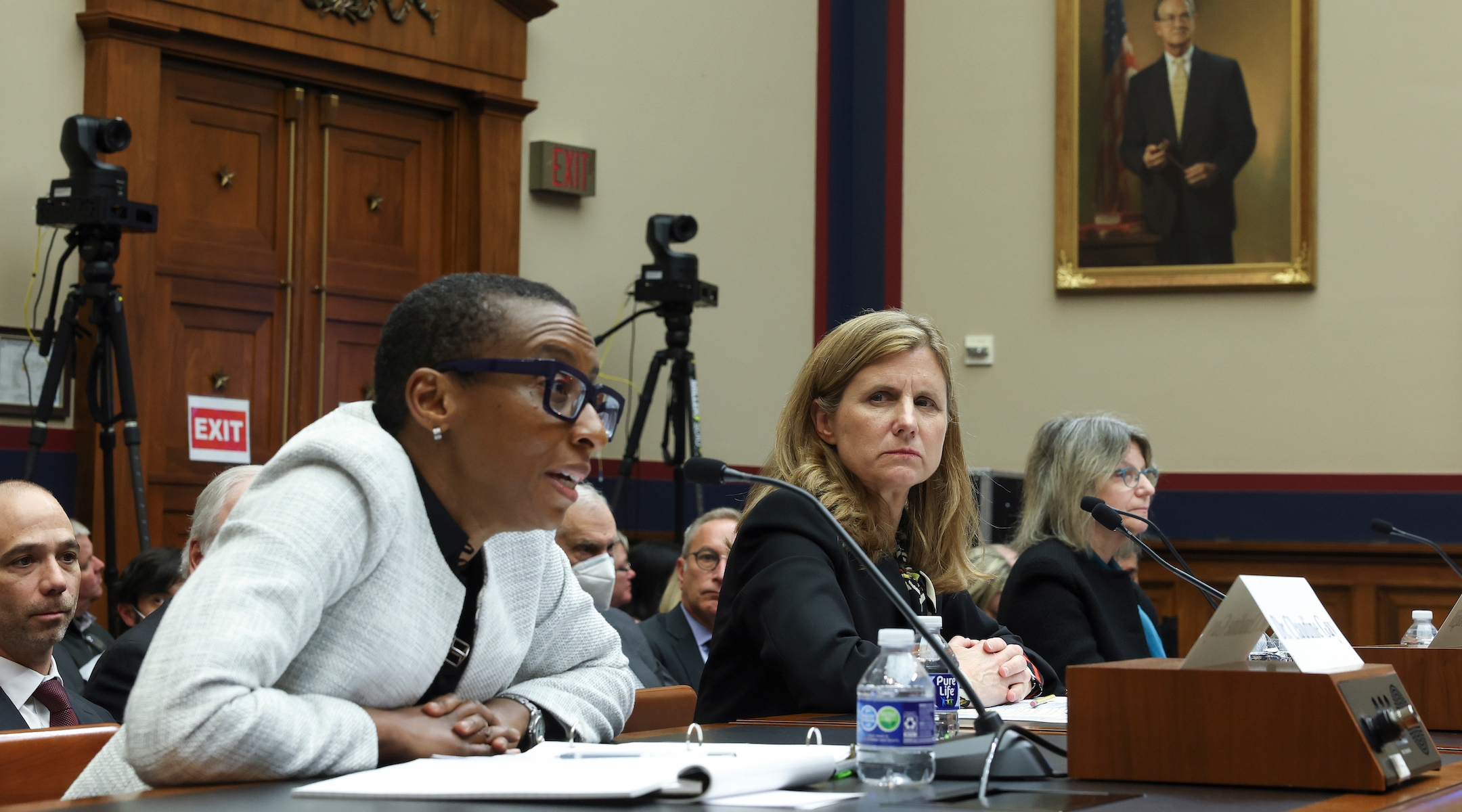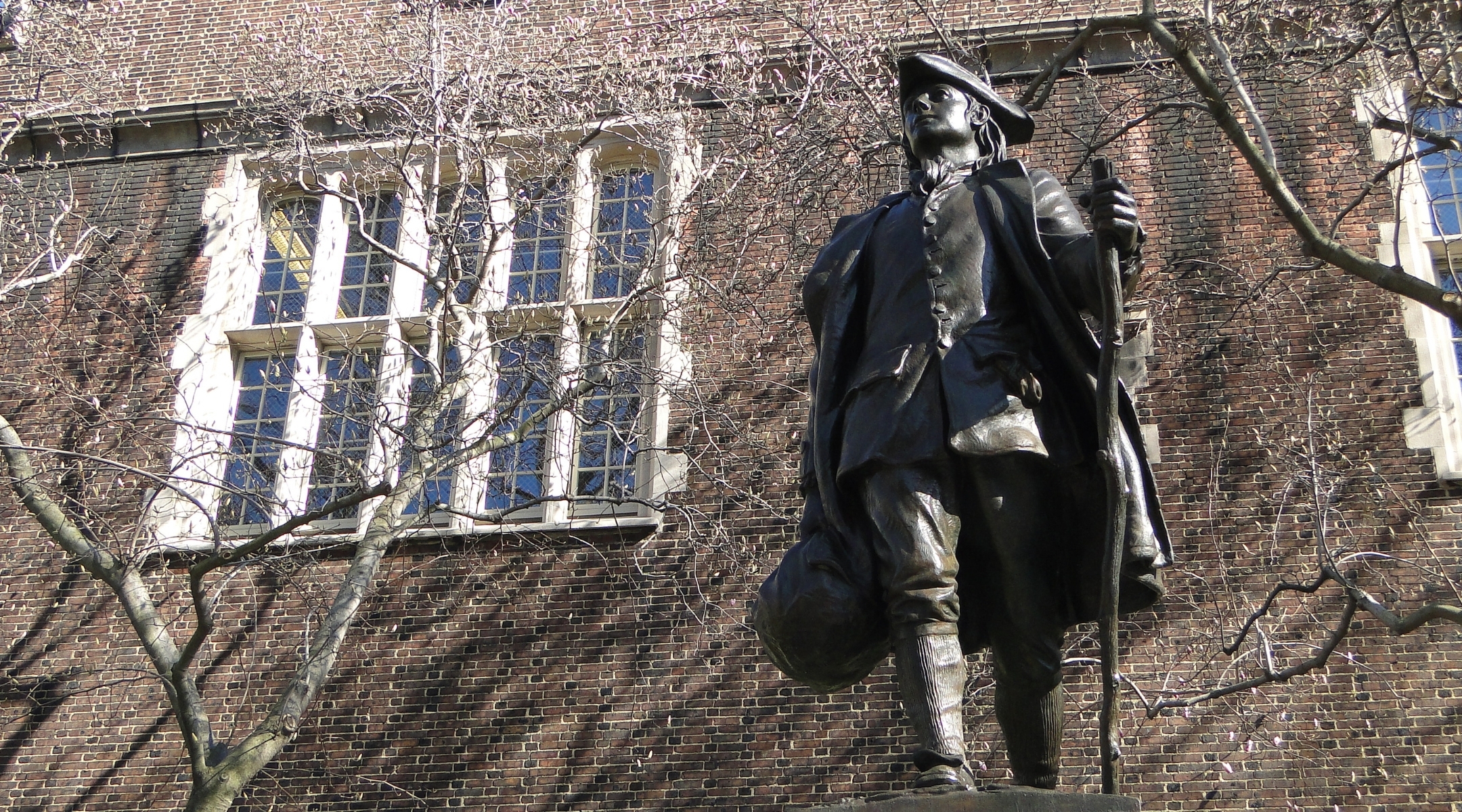Facing Congress, Harvard, MIT, Penn presidents defend efforts to fight antisemitism on their campuses
The hearing came amid rising campus antisemitism connected to the Israel-Hamas war

Claudine Gay, President of Harvard University, Liz Magill, President of University of Pennsylvania, and Sally Kornbluth, President of Massachusetts Institute of Technology, testify before the House Education and Workforce Committee on December 5, 2023, in Washington, DC. The Committee held a hearing to investigate antisemitism on college campuses. (Kevin Dietsch/Getty Images)
(JTA) – In a high-profile congressional hearing, the presidents of three of the nation’s top universities acknowledged that Jewish and Israeli students have felt unsafe on campus since Oct. 7 and said their schools were taking action to fight antisemitism.
But at times the three leaders — from Harvard University, the Massachusetts Institute of Technology and the University of Pennsylvania — did not define what kinds of antisemitic and anti-Israel speech could be formally disciplined on campus.
When New York Republican Rep. Elise Stefanik asked directly if “calling for the genocide of Jews” is against the universities’ respective codes of conduct, all three presidents said the answer depended on the context.
???Presidents of @Harvard @MIT and @Penn REFUSE to say whether “calling for the genocide of Jews” is bullying and harassment according to their codes of conduct. Even going so far to say it needs to turn to “action” first. As in committing genocide.
— Rep. Elise Stefanik (@RepStefanik) December 5, 2023
THIS IS UNACCEPTABLE AND… pic.twitter.com/hUY3SgoOOi
“It is a context-dependent decision,” Penn President Liz Magill responded, leading Stefanik to reply, “Calling for the genocide of Jews is dependent on the context? That is not bullying or harassment? This is the easiest question to answer ‘yes,’ Ms. Magill.”
Responding to the same question, Harvard President Claudine Gay said, “When speech crosses into conduct, we take action.” MIT President Sally Kornbluth said that such language would only be “investigated as harassment if pervasive and severe.”
Yet the presidents roundly agreed that antisemitism was a serious problem on their campuses and had grown more severe since Hamas’ Oct. 7 attack on Israel and the start of Israel’s war against the terror group in the Gaza Strip.
“I know some Israeli and Jewish students feel unsafe on campus,” Kornbluth said. “As they bear the horror of the Hamas attacks and the history of antisemitism, these students have been pained by chants in recent demonstrations.”
The presidents’ testimony came amid increased tensions on college campuses nationwide since Pro-Palestinian students or faculty — including at the three universities represented at the hearing — have made headlines for speech and actions on campus that a range of critics have called antisemitic or inappropriate.
Tuesday’s hearing — which lasted more than five hours and was called by the House education and workforce committee — was at least the fourth the Republican-led House has held on the subject of campus antisemitism since Oct. 7. But it was the first to summon university presidents to testify.
It came on the same day that the House endorsed a resolution initiated by the two Republicans in Congress that equates antisemitism and anti-Zionism.
Some Republicans sought to paint campus antisemitism as a product of universities embracing “the race-based ideology of the radical left,” as North Carolina Rep. Virginia Foxx, chair of the committee, said in her introductory remarks. Foxx said the presidents were there “to answer to and atone for the many specific instances of vitriolic, hate-filled antisemitism on your respective campuses,” and charged, “You have faculty and students that hate Jews, hate Israel.”
The university leaders all personally criticized anti-Israel activism. Magill condemned a recent pro-Palestinian-led attack on a Jewish-owned restaurant in Philadelphia that had begun with protests bordering her campus. “These protesters directly targeted a center city business that is Jewish- and Israeli-owned, a troubling and shameful act of antisemitism,” she said in her opening remarks.
But Magill would not say whether chants the protesters repeated — including one she referenced calling for “intifada” — rose to the level of incitement to violence that is punishable by the university’s code of conduct. During the Second Intifada two decades ago, Palestinian terror attacks killed an estimated 1,000 Israelis.
“The chanting, I think, calling for intifada, global revolution, [is] very disturbing,” Magill said during questioning. “I believe at minimum that is hateful speech that has been and should be condemned. Whether it rises to the level of incitement to violence under the policies that Penn and the city of Philadelphia follow, which are guided by the United States Constitution, I think is a much more difficult question. Incitement to violence is a very narrow category.”

A statue of a young Benjamin Franklin at the University of Pennsylvania. (Wikimedia)
She also demurred on how much advance action her administration was able to take against a controversial Palestinian literature festival held on campus earlier this fall, before Oct. 7, which has led the university to change its policies on guest speakers. Critics complained that speakers at the event, including former Pink Floyd member Roger Waters, had used language endorsing Israel’s destruction.
“I think canceling that conference would have been very inconsistent with academic freedom and free expression, despite the fact that the views of some of the people who came to that conference I find very, very objectionable because of their antisemitism,” she said.
Gay also did not say directly whether students chanting “intifada” on Harvard’s campus violated the university’s code of conduct.
“That type of hateful, reckless, offensive speech is personally abhorrent to me,” she said. But when asked whether Harvard would discipline it, she responded more generally, “When speech crosses into conduct that violates our policies, including policies against bullying, harassment or intimidation, we take action and we have robust disciplinary processes that allow us to hold individuals accountable.”
Schools have faced legal action and have lost out on donations from Jewish and pro-Israel advocates for their response to anti-Israel activism on campus, leading some to suspend pro-Palestinian student groups. None of the three universities represented on the panel have suspended such groups.
Jewish faculty at schools who have called for the deaths of Palestinians have also been disciplined, as have faculty members who celebrated Hamas’ attack.
Harvard in particular has come under scrutiny because Gay took days to issue a condemnation of Hamas after the Oct. 7 attacks, while a coalition of Harvard student groups immediately blamed Israel for them. She has since issued several condemnations, and said at the hearing that she would have responded sooner to the statement if she had realized it would be “wrongfully attributed to the university.”

Republican Rep. Julia Letlow, of Louisiana, pushed Gay to expel the students who had signed the letter, saying it helped encourage sexual violence toward women.
The school has since become a target of donor ire, with billionaire investor and Jewish Harvard alum Bill Ackman leading a charge to punish the university by withholding donations over its responses to the Israel crisis. (Through a spokesperson, Ackman has declined to comment to JTA about his strategy, but he has frequently gone after the school on X, formerly Twitter.)
Hundreds of Jewish Harvard alums are protesting the school by only giving $1, or by directing their giving to Harvard Hillel instead.
All three presidents have been in their current positions for less than two years. They all condemned the Hamas attacks, and all affirmed Israel’s right to exist; Magill and Gay, asked directly about the Boycott, Divestment, Sanctions movement targeting Israel, also said their schools are institutionally opposed to it.
Kornbluth, the only Jewish university president to testify, was also the only one to affirm during questioning that antisemitism training is a part of her university’s diversity, equity and inclusion office. Magill said that Penn was “in the midst” of including antisemitism training in all its anti-bigotry efforts. DEI departments have come under increased scrutiny from the right, who have increasingly claimed that they fuel campus antisemitism.
Later in the hearing, Kornbluth also advocated for increased Holocaust education as an antidote to antisemitism.
In addition to questioning from members of Congress, Penn is today under federal investigation from the U.S. Department of Education, partially connected to its holding of the Palestinian literature festival. Harvard is also facing an investigation, in its case related to an Israeli student who was reportedly attacked at a campus pro-Palestinian protest following Oct. 7.
At MIT, critics from both sides of the Israeli-Palestinian debate went after Kornbluth for partially suspending students who participated in a disruptive pro-Palestinian protest on campus. Supporters of the students alleged it was inappropriate for the school to take action against students for legally protected speech, while some conservative and pro-Israel groups said that Kornbluth hadn’t gone far enough.
Kornbluth’s disciplinary actions were not addressed at the hearing, though they were referenced at a Republican-led press conference held prior to the hearing. At that event, a handful of Jewish and Israeli students at MIT, Penn, Harvard and other campuses painted pictures of a university climate that was unable or unwilling to discipline antisemitism.
“The MIT administration, namely President Sally Kornbluth, has failed to address the crisis of rampant antisemitism on campus,” Jewish MIT graduate student Talia Khan, the daughter of a Jewish mother and Afghan Muslim father, said.
“What is the administration doing? We’ve brought them policy violations, proof that they happen, and the student handbook that were explicitly violated,” Jewish Harvard Law student Jonathan Frieden said. “When they respond, if at all, responses are empty and meaningless responses such as, ‘We are aware of the situation.’”
Republican House Speaker Mike Johnson quoted Israeli Prime Minister Benjamin Netanyahu at the press conference.
“I think Prime Minister Netanyahu probably said it the best: This truly is a battle between good versus evil, light versus darkness, civilization versus barbarism, and the idea that this is happening on college campuses, university campuses, across this land is unconscionable to us,” he said. “This antisemitism has become all too common. It’s turning to violence in some of these places. And the idea that university administrators would not speak out, would not take care of this problem, is just beyond comprehension.”
Some Democrats on the committee also criticized the presidents for what they said was an unacceptable approach to Israel-related issues on campus. Rep. Kathy Manning, a North Carolina Democrat and former chair of the Jewish Federations of North America, grilled Gay on Harvard’s Middle East Studies courses, which she claimed included “false accusations that Israel is a racist, settler colonialist, apartheid state.”
Manning pushed Gay to say she is “absolutely committed” to ensuring that Harvard’s Middle East Studies department features a variety of perspectives on Israel.
Also testifying was Pamela Nadell, a professor of American Jewish history at American University and the Democrats’ chosen witness for the hearing.
“It is fashionable among too many members of your campus communities to hate Jews,” Foxx said to the administrators in her closing remarks. “We’ll now be watching, and I genuinely hope, for the sake of our nation, you will rise to meet the challenge.”
Ron Kampeas contributed to this report.
This article originally appeared on JTA.org.















